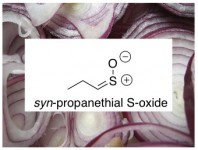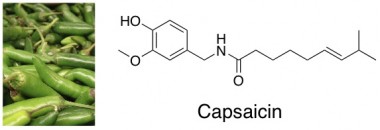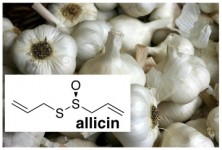For the Super Bowl this year, I made one my favorite recipes – fresh salsa. Someone with timei.e., not me on their hands could write an entire textbook chapter about the chemistry of salsa, but here’s a little Cliff Notes version. Warning: it’s not all appetizing, especially if you’re a cilantrophobe.
Onions. You can’t leave onions out of a good salsa, which unfortunately means that you’re going to shed a few tears. The primary eye-stinging culprit in chopped onion is the volatile molecule below, called syn-propanethial-S-oxide. If you must avoid crying, mince your onions in a fume hood.

Cilantro. I love cilantro, as do the rest of my family members. But some people absolutely despise the stuff – there’s even a facebook group called “I HATE CILANTRO”. Apparently a lot of cilantro haters are genetically predisposed to perceive its taste as soapy rather than delicious and refreshing. Others perceive the flavor as “buggy” (ew). A hodgepodge of long-chain aldehydes (analyzed by GC/MS) contribute to the taste and odor of this herb, such as the ones below.

Most notably, the amount of 2-decenal (in red) increases dramatically during and after the flowering stage of the cilantro plant. 2-Decenal is a molecule that has also been found in the defense secretions of insects (I just lost my appetite). Therefore, it is best for cilantro to be harvested before it flowers, so that levels of this objectionable aldehyde remain low.
Hot peppers. Most of the heat of peppers (I use serranos) comes from an organic molecule called capsaicin. If you love hot food, you can buy the t-shirt.

This molecule is pretty hydrophobic, which means that it’s better at dissolving in oil or other organiccarbon-based liquids than in water. For this reason, chugging water does very little to cool a burning tongue. If you want relief, you’ve got to drink milk or have a bite of yogurt or well-buttered bread. These dairy products contain fats (organic, greasy molecules) that help carry away the capsaicin. You can also drink a spoonful of oil, but that seems to negate the healthiness of salsa.
Garlic. Raw garlic has a good kick to it, which can be largely attributed to a molecule called allicin. If anyone wants to be a super chemistry nerd, this would be a good name for your daughter. When you heat garlic, allicin and other odorous molecules break down, so cooked garlic isn’t as pungent as raw.



Woohoo!
I love homemade salsa. Can’t get enough! What do you do for chips? In LA we would buy ours from a restaurant. They were just so much better than what we could get at the store.
I am firmly entrenched in the pro-cillantro camp.
Also, I’ve heard that running your knife through some water helps keep you from tearing up … and from the looks of syn-propanethial-S-oxide, that might just work!
I heard from a biochemistry professor last year that cilantro can also act as a mercury chelator, which is (somewhat) verified by this journal article (http://www.ncbi.nlm.nih.gov/pubmed/15721537). That being said, if you look up “cilantro and chelation” on the Google you get a lot of dubious “detoxify your body” websites, so perhaps I will stick with eating cilantro because I like the taste.
Good post!
Matt, a water faucet is much cheaper than a home fume hood, so that sounds like a good tip for preventing onion tears. I usually just get chips from the store – in AZ there were more options than the Tostitos here.
Adam, that is fascinating about cilantro + mercury. So maybe it’s good to serve a cilantro-heavy side dish along with a fish entree, kind of balance out the mercury levels.
Thanks for the trivia and for reading : )
babies are pungent so Allicine would do. If its a boy I would name him Ethan (or Allen)
actually, i trick that works great to keep one from tearing up is to put the tip of your tongue to the roof of your mouth while you are chopping unions! I am not sure why, but this works! and I wish I could find the link in lifehacker in which i read this! (it also came with tips like putting a wooden spoon in the pot when boiling milk (say for hamburger helper) to keep it from boiling over!
this blog is great!
ps: oh! here’s the link: http://www.lifehacker.com.au/2009/10/keep-onion-cutting-tears-at-bay/
Cheryl
Thanks Cheryl : )
Haha I am currently trying to press my tongue against the roof of my mouth AND breathe through my mouth as the article suggests and I can’t breathe at all! Is this like a try-to-lick your elbow thing? Am I doing it wrong?
They say: “you can stop tears by merely putting your tongue on the roof of your mouth while you’re cutting. Whatever you do, though, don’t breathe through your nose—breathe through your mouth. “